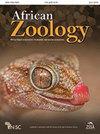历史范围内围栏野生动物保护区濒危Addax(Addax nasomaculatus)的栖息地选择和觅食偏好:支持有效重新引入的见解
IF 0.5
4区 生物学
Q4 ZOOLOGY
引用次数: 0
摘要
物种的重新引入应该基于生态知识,这是提高成功概率的基础,也是预测对未来不断变化的景观的反应的基础。addax(addax nasomaculatus)是一种生态基本未知的濒危羚羊,在突尼斯Jbil国家公园的围栏区被放生。考虑到该地区的极端沙漠条件,季节变化应影响栖息地和饮食选择。Addax的发生、栖息地选择和饮食使用综合方法进行评估,并用多元统计进行分析。在丰水期,优选和避免的植物物种丰度与addax的发生高度相关;而在旱季,优选植物物种的丰度与addax的存在呈正相关。粪便样本的微观组织学分析表明,不同季节的饮食存在差异。拟议的综合方法有助于评估干旱环境中濒危羚羊的栖息地适宜性,为重新引入方案和栖息地恢复措施的范围内的决策做出有益贡献。本文章由计算机程序翻译,如有差异,请以英文原文为准。
Habitat Selection and Foraging Preference of the Endangered Addax (Addax nasomaculatus) in a Fenced Wildlife Reserve within Its Historic Range: Insights for Supporting Effective Reintroduction
Reintroduction of species should be based on ecological knowledge, which is fundamental to enhancing the probability of success, but also in predicting the response to future changing landscapes. The addax (Addax nasomaculatus), an endangered antelope whose ecology is mostly unknown, was released in a fenced area of the Jbil National Park, Tunisia. Considering the extreme desert conditions of the area, seasonal changes should affect both habitat and diet selection. Addax occurrence, habitat selection and diet were assessed using an integrative approach, and analysed with multivariate statistics. During the wet season, preferred and avoided plant species abundance were highly correlated with addax occurrence; while in the dry season, preferred plant species abundance were positively correlated with addax presence. Micro-histological analysis of faecal samples indicated differences in diet between seasons. The integrative approach proposed represents a useful contribution for decision-making in the scope of reintroduction programmes and habitat restoration measures, by facilitating the assessment of habitat suitability for endangered antelopes in arid environments.
求助全文
通过发布文献求助,成功后即可免费获取论文全文。
去求助
来源期刊

African Zoology
生物-动物学
CiteScore
2.60
自引率
9.10%
发文量
18
审稿时长
>12 weeks
期刊介绍:
African Zoology , a peer-reviewed research journal, publishes original scientific contributions and critical reviews that focus principally on African fauna in terrestrial, freshwater, and marine ecosystems. Research from other regions that advances practical and theoretical aspects of zoology will be considered. Rigorous question-driven research in all aspects of zoology will take precedence over descriptive research. The Journal publishes full-length papers, critical reviews, short communications, letters to the editors as well as book reviews. Contributions based on purely observational, descriptive or anecdotal data will not be considered.
The Journal is produced by NISC in association with the Zoological Society of South Africa (ZSSA). Acceptance of papers is the responsibility of the Editors-in-Chief in consultation with the Editors and members of the Editorial Advisory Board. All views expressed are those of the author and not necessarily those of the Editors or the Department.
 求助内容:
求助内容: 应助结果提醒方式:
应助结果提醒方式:


